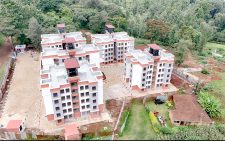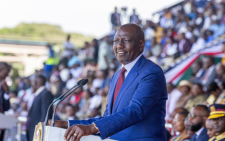Housing levy hits Ksh120B as State speeds up rollout

The government has collected approximately Ksh120 billion through the Housing Development Levy since the mandatory 1.5 per cent deduction on Kenyan workers’ gross monthly income came into force, Principal Secretary for Housing and Urban Development Charles Hinga has revealed.
Speaking in Mombasa during a meeting with the National Assembly Departmental Committee on Housing, Urban Planning and Public Works, Hinga noted that about Ksh90 billion has already been spent on various housing projects across the country.
“But as we move forward and the number of completed units increases, payments for these houses are also rising. We anticipate a time when the inflow from house payments will exceed what we collect from the levy,” he stated.
The meeting, chaired by Emurua Dikirr MP Johana Ng’eno, brought together key stakeholders to evaluate the progress of the affordable housing initiative.
Unexplained delays
Ng’eno denied reports of divisions within his team, even as Saturday’s meeting at Serena Hotel in Mombasa faced unexplained delays.
The committee had been conspicuously absent from the morning session, fuelling speculation of internal wrangles.
By lunch hour, committee members were seen walking to the hotel restaurant from the beach, sparking further questions. Ng’eno, however, downplayed the concerns.
“Of course, the PS was here alone—as a PS. I am here alone as the chair. We’re beginning our official session at 2.30 pm, and members will be present,” he said.
He clarified that the meeting was meant to introduce committee members to regional project leads who manage housing projects in various counties.
“This was a critical engagement. Most of the regional representatives had never met the committee. Members needed to connect with them to better understand the progress in their constituencies,” Ng’eno explained.
He emphasised that such meetings do not necessarily take place in traditional boardroom settings.
“Even Parliament is constitutionally allowed to sit anywhere, provided proper procedures are followed,” he said.
Hinga reported that the affordable housing programme has surpassed the 200,000-unit mark, with 148,000 units currently under active construction.
He said the ministry has also secured a pipeline of over 700,000 units, with precise data on their locations and the land parcels earmarked for construction.
“We are operational in 44 out of 47 counties. For the remaining three, we have advertised tenders. So, it’s only a matter of time before all counties are fully covered,” he said.
The PS claimed the programme has a huge economic potential, pointing out that housing has one of the longest value chains in the economy.
“Almost every component of a house—whether it’s a bulb, a socket, a hinge—can be an industry by itself if done at scale.”
To empower local artisans, he said the ministry has ring-fenced Ksh11 billion for Jua Kali operators to supply three key items—doors, windows, and balustrades.
Hinga revealed that 69 components have been identified as viable for local production.
According to Hinga, the programme is growing in scale, citing elevators as an example.
“Before the programme, the whole country only used around 750 elevators. With our projects alone, we now require 2,750 lifts. That’s almost four times the national demand.”
The government is now inviting global lift manufacturers to set up local assembly plants or full-scale production in Kenya to support the demand and create technical jobs.
Lower deposit
Following talks with the Central Organisation of Trade Unions, the ministry has agreed to lower deposits for salaried workers from 10 per cent to 5 per cent.
Workers had raised concerns about being subjected to the same interest rates as non-contributors to the housing levy.
The PS outlined a structured plan to ensure Kenyans can afford and eventually own these homes.
After completion of payments, homeowners will receive keys and a sectional title, securing ownership.
“If you complete your payments over 13 years, you will get the title deed. That’s generational wealth. It’s how we build a nation—families inheriting homes,” he said, adding that this model mirrors the spirit behind the “American Dream.”
To make the units more accessible, Hinga said individuals earning less than Ksh25,000 monthly can apply for deposit assistance from the Affordable Housing Board.
For those earning between Ksh20,000 and Ksh150,000, the interest rate is fixed at six per cent—a significant drop compared to commercial mortgage rates that range around 15 per cent.












